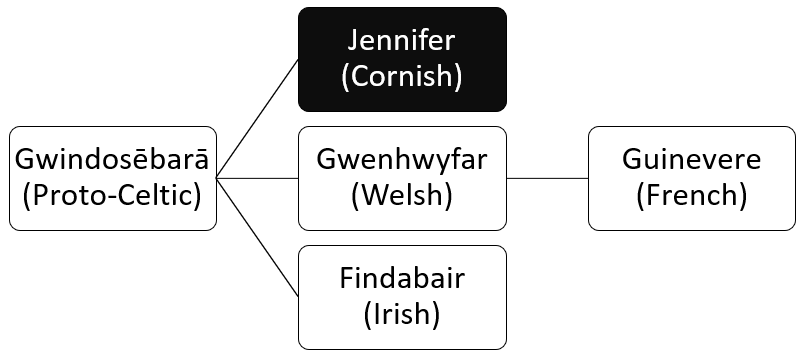
Jennifer, your name is really cool. It’s a cognate of an Irish goddess’s name, known as Findabair. Or Finnabair. Or Fionnabhair. It’s a lovely name with a long history, likely reaching back to Proto-Celtic languages. It’s most likely a compound of “Gwindos – White” and “Sēbarā – Spirit/Fairy/Phantom.”
Sindarin
Sindarin has a word that means basically that: Fân. A fân is a shining white shape or body often seen in a vision of a Maia. It’s also a word for “cloud,” because clouds are shining white shapes in the sky too.
Neither are gendered in their construction, but Jennifer is considered a feminine name. So, we can add one of a few feminine name suffixes to Fân. It will change the meaning slightly to “Female Shining Maia Spirit-Shape/Body/Vision” making: Faneth, Fanel, and Fenil. Or, we could add “gwend – maiden” or “dîs – woman” to it instead, making: Fanwen and Fandis.
These aren’t really names that would fit into Middle-earth. Elves don’t take names where they claim to be deities. They can have a name that denotes their relationship to the deity. So, if you want to adapt this name into an RP or fanfic, I suggest adding “dîl – person with a devoted interest in a thing but not affection,” “sêr – person with platonic fondness for the thing/person,” or “mellon – person who loves the thing/person” to Fân instead of a gendered suffix, making: Fandil, Fasser, and Famellon.
Quenya
In Quenya, Fana, the cognate of Fân, lost its spiritual meaning and just means “cloud.” So, we’ll have to go a separate route for the Quenya translation.
First, “white.” There are different words for “white” in Quenya with different connotations. Fána means “shining white (like a cloud!),” which probably our best bet. Other words refer to the white light of stars, or the whiteness of snow, but this, knowing its history, just makes the most sense to me.
The second element, “Spirit/Fairy/Phantom” is a little tricky, seeing as we’re talking about an Elven language here, and “fairy” doesn’t really make sense to go for. There are several words along the lines of “spirit/phantom”: faire – a disembodied spirit or phantom and eala – a being that is a spirit but not a body. I skipped over “manu – departed spirit” because that sort of spirit would be in Mandos, not wandering the woods freaking people out; “hó – spirit, shadow” because that’d be the opposite of a white spirit; and “fea – a soul in its body” because, well, it’s still incarnate and not able to wander around the woods freaking people out as a weird white shape, not unless that person was up to some shenanigans.
Putting together Fána and Eala/Faire makes these genderless names: Fáneala and Fánafaire. To gender this name, we’ll add the feminine suffix -e, making: Fáneale and Fánafairie.
Unlike the Sindarin version, these names aren’t connected to the divine, so it wouldn’t be impersonating a deity to have them, making it an okay name for an Elf. It sounds like an Epesse (nickname) someone who was infatuated with you came up with, definitely not a name you’d give yourself unless you were pretty conceited, so consider this when naming a character.
![]()
Jennifer, I hope you like this article and found something helpful or interesting in it.
If you’d like your name translated in this series, comment below and I’ll consider it for a future article!
Sources:
Schrijver, Peter (1995). Studies in British Celtic Historical Phonology. Rodopi. pp. 249–50.
Monaghan, Patricia (2009). The Encyclopedia of Celtic Mythology and Folklore. Infobase. p. 188.
